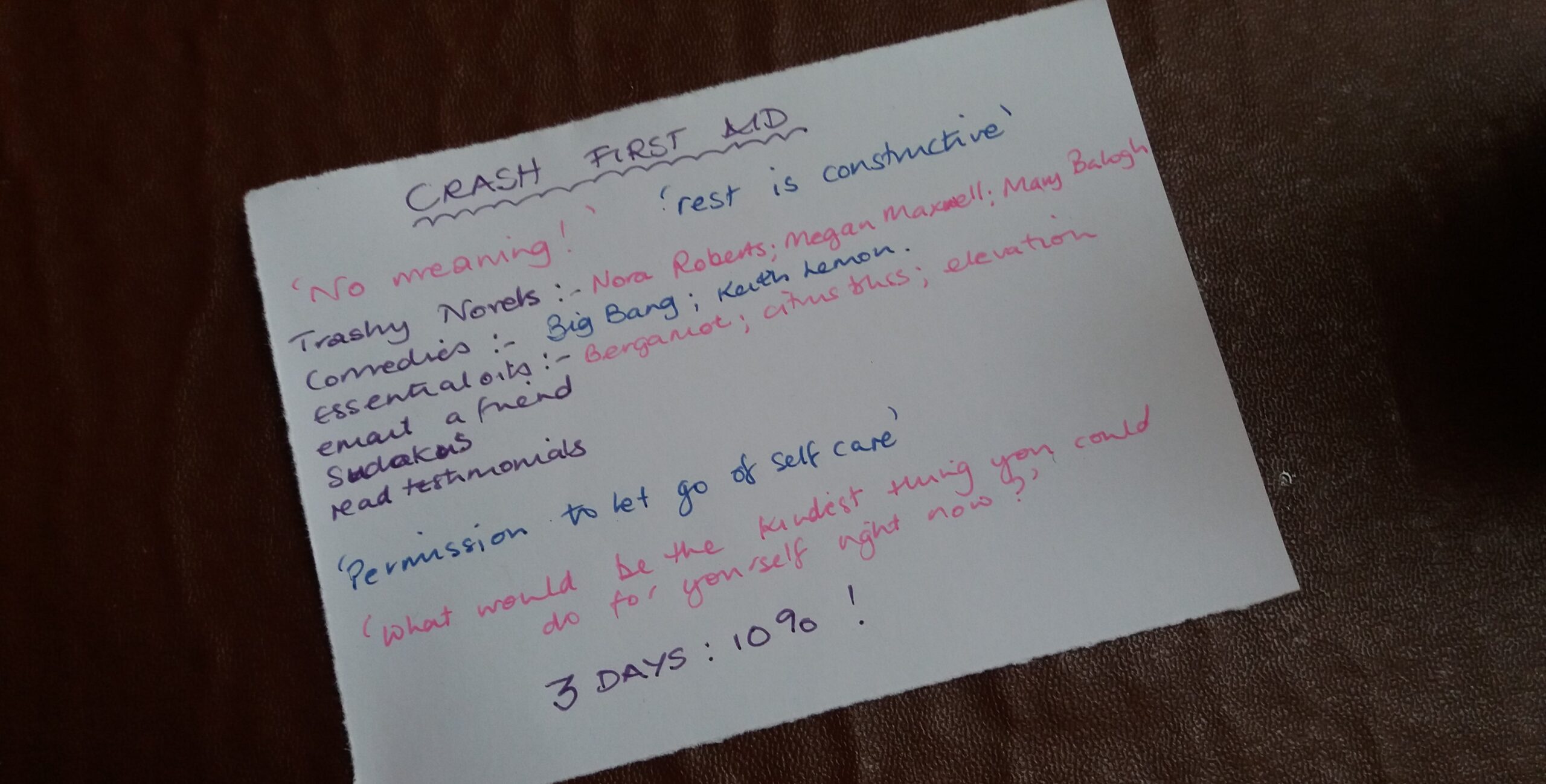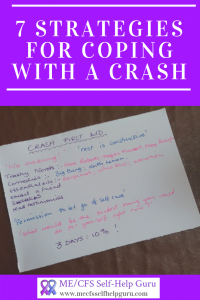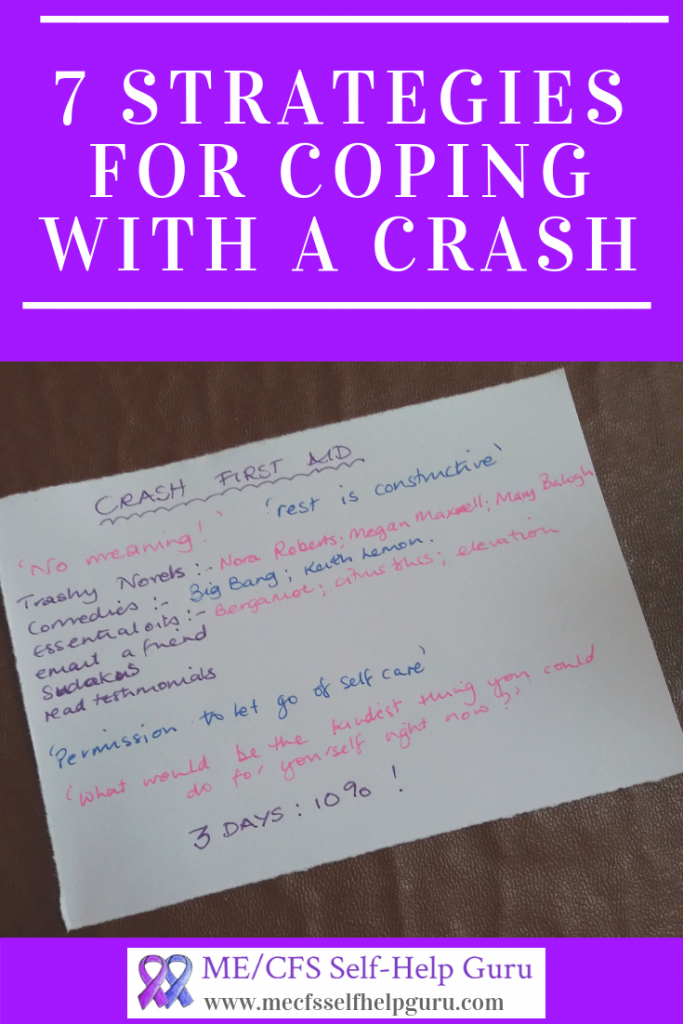No matter how good you get at illness management, ME/CFS has a special way of hiding your true energy levels from you and tricking you into doing too much. This happened to me a few weeks ago. I’m now just about out from the other side of the crash and back to reasonable level of functioning. Even though my crashes have been rare this year, I’m a veteran at this, so I’ve got my coping strategies down to a T.
- Reject all meaning
When I’m in a crash my brain chemistry suffers and I feel very low. In this state it’s so easy to get worried about what this crash might mean for future well-being. I can get inundated with ‘what if’ thoughts, accompanied by the ‘what went wrong?’ and ‘how could I have been so stupid’ thoughts. Fortunately, I know that these thoughts are all about a skewed brain chemistry, so every time one comes up I just tell it ‘I’m not doing meaning right now, I don’t need to think until I start feeling better!’ It takes a bit of vigilance but it’s not as tiring as the worry and angst that follow if I allow the thoughts freedom to roam.
- Make myself as comfortable as possible while I wait for the worst to pass
Getting through a crash is all about pleasant distraction. I don’t expect myself to enjoy myself because I know that joy just isn’t possible in this state. But I do what I can to make all the extra resting and inactivity as pleasant as possible. I remind myself that resting is the best thing I can do right now. I aim to see it as me doing something really constructive for my well-being. I set myself the challenge of getting really good at resting and of being at peace with resting.
It’s not always easy to remember my strategies with crash brain-fog, so I have them written on a postcard for when I need them. In addition to ‘no meaning’ and ‘Resting is constructive, it’s helping me get better’ I include a list of all things I can do to make waiting out the crash as comfortable as possible: Read a trashy novel (with reminders of my favourites); watch some comedy (with reminders of my favourites); do Sudokus; burn uplifting essential oils; Send a nice email to a friend; read testimonials. I’m generally pretty good at offering myself compassion and acceptance even when in that negative frame of mind, but for my clients that struggle with this, I recommend that they write themselves a kind letter when they are in a good frame of mind, telling themselves all the things that they might need to hear when in a crash.
- Giving myself permission to let go of some self-care
Often, when I’m in a crash my everyday self-care, like my gentle yoga routine, can seem like a huge burden. I don’t want to do it, and the thought of making myself do it is about as appealing as taking a gentle stroll over a mile of hot coals. If making myself do something while I’m in a crash would require a great deal of bullying, I just give myself permission to let it go for now. I have enough experience to know that when I offer myself a permissive attitude, as soon as my energy starts to pick up and I’m moving out of the crash state, my motivation jumps back in and all of a sudden, it’s relatively easy to get started again.
- Keep asking myself what’s the kindest thing I can do for myself
When I find myself trying to bully myself into being better at taking care of myself, I often ask myself ‘what would be the kindest thing I could do for myself right now?’. This also works well at any time that your negative brain chemistry is plying you with ‘should’ thoughts.
- Keep up the happiness practises as much as I can
Although my happiness practices don’t work very well when I’m in a crash, I do what I can to keep them going without any expectations of joy. I know that by keeping them going, when my brain chemistry does right itself, I’ll be all set up to experience it again. Habits of gratitude, appreciation and taking a moment are like any other habit. It’s easier to keep them going than it is to start again from scratch. When I let them go it takes work to set them up again and the joy will take a while to be so readily available. The key to making this strategy work though is to really give them permission to not work for a while. If you keep expecting yourself to find the joy that you used to be able to, with these practises they can become a stick to beat yourself up with, in which case it’s just better to let them go.
- 3 day 10% rule for managing improvement
The one thing that is most likely to prolong a crash is the excitement we feel when we feel a little better. It feels so good that we can’t help ourselves from trying to catch up on all that we’ve been missing out on over that last few weeks. Although it’s extremely hard to put into practise I’ve found that by waiting 3 days before I up my activity when I’m feeling better, then only increasing by 10%, my ascent from the depths of a crash runs much more smoothly and I end up getting back to baseline a lot quicker. The turtle really does beat the hare in this respect!
A small favour: I’d be really grateful if you could you rate this article using the stars below the related posts. Many thanks!








This works as a good motivation for me. Thank you.
Glad it helps Marika!
This is such a good strategy, I am printing it out to remind myself to be kind.
Thank you
It’s such a shame we need to remind ourselves to be kind, but being kind to ourselves takes a lot of practise! Good luck!
How do you gauge 10%? And how do you keep your life that in control to wait 3 rays and then increase? It often seems when I’m in a dip, it is extended because life just keeps on and I am not able to check out of life that long to recover (It is made extra challenging as I live alone and am bedbound with daily agency caregiving currently)
Hi Rachel,
For me the 3 day 10% rule was something that helped me, because I was always tempted to jump straight back into things as I started to improve and needed to hold myself back. I would guage it with time, so if one day I could only read for 40 minutes, I would only let myself read for 44, when I was starting to feel better. This was much more about keeping things in perspective, rather than strictly adhering to limits.
What is much more helpful, expecially when it feels like keeping to those boundaries is impossible, is to cultivate and attitude of trust. When it feels like you need to be more active than you feel is wise, approach it with relaxed effortelssness and trust that without worry and resistance all will be well. We can save so much energy from not stressing about getting things right!
I no longer use the 3 day, 20% rule because I now trust myself to go with the flow and listen to my inner wisdom. This was a tool I used when my old programming to push and strive was very active and unhelpful.
I’m currently running a FREE 5-day masterclass, to help you connect with your inner wisdom, you can join here: https://bit.ly/BBMM24